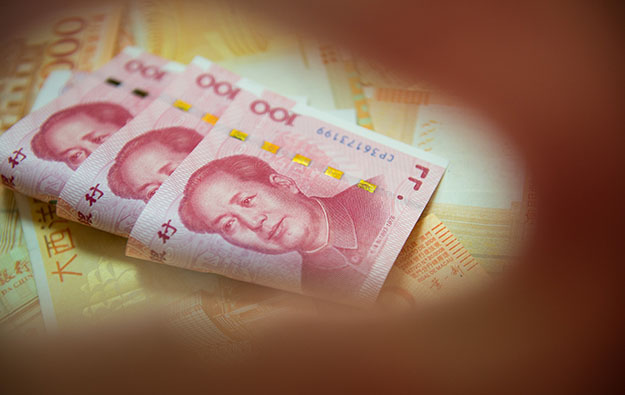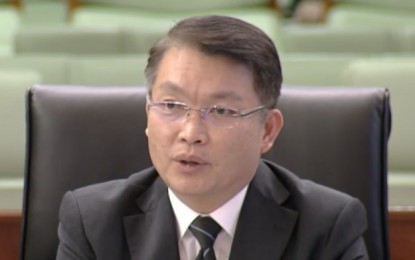Beijing new grey money curbs with unclear impact on Macau
Feb 15, 2019 Newsdesk Latest News, Macau, Top of the deck

It is still too early to assess the effect on Macau’s casino industry of a new round of rules on foreign currency transactions announced by the mainland China government late last month, said brokerage Sanford C. Bernstein Ltd in a note issued on Friday.
It added that, for now, the new rules seemed not to have had a negative impact on Macau’s gaming market, particularly on the city’s junket operators.
“The devil is in the details and enforcement,” analysts Vitaly Umansky, Eunice Lee and Kelsey Zhu wrote. “It’s unclear as of yet what (if anything) the government will target.”
The Sanford Bernstein team added: “The junket conversations we have had so far are that there has been some ‘chatter’ around these new pronouncements, but this seems more like talk and nothing more at this stage. From our sources, there has been no meaningful disruption in money flows in the channels – i.e. ‘business as usual’.”
The Chinese central authorities issued on January 31 a judicial interpretation of laws regulating some types of foreign currency transactions. Such pronouncement took effect on February 1.
“The rules, issued by the Supreme People’s Court and the Supreme People’s Procuratorate (the prosecutor general), highlight a slew of foreign exchange movement transactions, most of which are already illegal in China,” the Sanford Bernstein analysts noted.
They added: “A strict reading of the rules implies almost all avenues of money movement outside of banks is restricted. But the reality is that this was largely the case already. For example, it has always been technically illegal to have pools of capital that match sellers and buyers of renminbi – the backbone of underground banks.”
According to investment analysts covering the casino industry, many Macau junkets use underground banking networks to transfer money between Macau and mainland China. As such, any fresh crackdown on underground banking has the potential to hurt junket liquidity.
Fitch Ratings Inc said in a report earlier this week that it expected China’s shadow financing – which includes underground banks – to decline for a second year consecutive year in 2019. The ratings agency said such decline would however take place more gradually than in 2018, as the Chinese authorities “balance reining in excessive leverage and supporting economic growth”.
“The regulatory crackdown on shadow banking should, if maintained, support the long-term stability of the financial system and reduce risks for asset managers, but is likely to continue to create funding challenges across the economy in the near term, particularly for private-sector enterprises,” said Fitch Ratings.
Smaller junkets more exposed
The Sanford Bernstein team stated in its Friday note that the new rules gave “law enforcement more tools to work with in targeting activity that was already largely operating outside the bounds of what is allowed”.
The analysts added: “In the end, enforcement will be the key to what happens. It is too early to say at this stage what the impact on Macau may be. If the rules are all strictly enforced and the scope of government action against all forms of money movement is deep and broad, the impact would be severe”.
The brokerage mentioned in its note that “smaller junkets and agents” were those more likely to be impacted by the new rules. “The view from the large junkets is they are broad enough with numerous channels where creative mechanisms are always in play.”
The brokerage also highlighted that a “severe clampdown” on currency transactions between mainland China and Macau could “be a perverse incentive to shift to more under-the-table betting which would negatively impact VIP gross gaming revenue” in Macau.
“Another impact could be further consolidation among the junket entities to create larger more diversified capital bases,” the Sanford Bernstein added.
The brokerage noted that enforcement against illegal money transactions between mainland China and Macau had been on-going for years already. “In what is a porous capital control environment, there are always new methods devised to get around the rules,” its analysts noted.
According to Macau police reports, illegally modified handheld UnionPay terminals, also known as point of sale (POS) units, are often used to evade the normal currency export rules from mainland China. The devices are typically tampered with in such a way that the UnionPay network identifies them as being registered and operated in mainland China, where transaction fees charged by the China UnionPay system are much lower than in Macau.
A number of investment analysts have commented that purchase – and instant return in exchange for a cash refund – of high-value goods at jewellers and pawnshops in the city, is another route for mainland Chinese gamblers to skirt strict controls on export from the mainland of Chinese currency.
Macau authorities regularly conduct operations against the use of unauthorised UnionPay point-of-sale machines and unauthorised foreign currency exchange touts. Last month, Macau’s Judiciary Police told local media that the force had helped disrupt a “large-scale” criminal operation allegedly involving point-of-sale machines that processed HKD1.2 billion (US$153 million) in transactions during 2018 alone.
The Monetary Authority of Macao has been introducing tighter, real-time monitoring systems for payments and cash withdrawals made using UnionPay bank cards in Macau. That includes the use of automated teller machines (ATMs) with the ability to perform facial recognition scans.
Since January 2018 mainland Chinese have been restricted to an annual CNY100,000 (US$14,757) limit per person for cash withdrawals when using overseas ATMs. In the past, China’s regulatory definition of “overseas” transactions has included ones performed in Macau.
In December 2016, the Monetary Authority of Macao already had set a limit of MOP5,000 (US$626) or HKD5,000 per transaction for withdrawals in the city’s ATMs using bank cards issued by mainland China banks.
Related articles
-
 Grand Lisboa to tap ex-junket space as...
Grand Lisboa to tap ex-junket space as...Nov 13, 2024
-
 Galaxy Ent can opt new finance model...
Galaxy Ent can opt new finance model...Nov 12, 2024
More news
-
 Macau to get 36mln visitors in 2025:...
Macau to get 36mln visitors in 2025:...Nov 21, 2024
-
 Star Entertainment clinches US$130mln...
Star Entertainment clinches US$130mln...Nov 21, 2024
Latest News
Nov 21, 2024
Macau’s 2025 visitor tally could reach 36 million, or a circa 9-percent gain on this year’s projected 33 million. So said Lei Wai Nong (pictured in a file photo), the city’s Secretary for...Sign up to our FREE Newsletter
 (Click here for more)
(Click here for more)
Pick of the Day
”As we navigate the final steps of the licensing process, we remain confident in our ability to align with Brazil’s regulatory requirements”
Eusebio Tanco
Chairman of DigiPlus Interactive
Most Popular
 Gaming technology firm IGT reports hacking incident November 21, 2024
Gaming technology firm IGT reports hacking incident November 21, 2024  US$30bln 2025 GGR target achievable for Macau: CE November 19, 2024
US$30bln 2025 GGR target achievable for Macau: CE November 19, 2024  Marina Bay Sands projects 40pct EBITDA leap post extension November 20, 2024
Marina Bay Sands projects 40pct EBITDA leap post extension November 20, 2024  Macau big-event outdoor venue gets trial run Dec 28: CE November 20, 2024
Macau big-event outdoor venue gets trial run Dec 28: CE November 20, 2024  Future of gaming is the online format: Pagcor chairman November 20, 2024
Future of gaming is the online format: Pagcor chairman November 20, 2024









